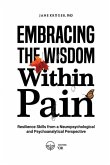Resilience is often misunderstood as merely the ability to bounce back from adversity. It encompasses a broader spectrum, acting as a vital skill that enables individuals to navigate through life's challenges with strength and adaptability. At its core, resilience involves the capacity to maintain a sense of purpose and hope, even when faced with overwhelming obstacles. For those grappling with depression, anxiety, or loss, recognizing resilience as an integral part of human experience can be a pivotal moment in the journey toward healing and growth. It is not only about survival; it is about thriving despite the storms we endure. Defining resilience requires us to distinguish it from mere endurance. While endurance suggests a passive acceptance of hardship, resilience actively involves engaging with our struggles. It is about finding ways to cope, adapt, and even transform through adversity. This engagement might manifest as seeking support from others, employing coping strategies, or discovering new perspectives on life's difficulties. For individuals dealing with feelings of hopelessness or grief, understanding that resilience can be cultivated through proactive measures can spark a sense of empowerment and motivate them to take action. Resilience is also deeply connected to our sense of purpose and belonging. When individuals experience trauma or significant loss, they often question their identity and value in the world. Building resilience involves reconnecting with one's core values and aspirations, which can provide a guiding light during dark times. It encourages the exploration of what truly matters and fosters a sense of community and support, reminding us that we are not alone in our struggles. Engaging with others who share similar experiences can enhance feelings of connection and remind us of our shared humanity. Mindfulness and positive thinking play crucial roles in developing resilience. Mindfulness encourages individuals to be present with their thoughts and emotions without judgment, fostering a compassionate awareness of one's experiences. This practice can help in recognizing negative thought patterns that contribute to feelings of depression or anxiety. On the other hand, cultivating a positive mindset does not mean ignoring pain; rather, it involves acknowledging difficulties while also seeking out moments of joy and gratitude. These practices can serve as powerful tools for individuals seeking to rebuild their lives after trauma or loss. Ultimately, resilience is a journey rather than a destination. It evolves as we encounter new challenges and learn from our experiences. Embracing resilience means accepting that setbacks are a natural part of life, and each setback can serve as an opportunity for growth. By redefining how we view adversity, we can foster a mindset that not only survives struggles but thrives in their aftermath. For those feeling trapped in despair, understanding and cultivating resilience can illuminate a path toward healing, purpose, and renewed hope.
Hinweis: Dieser Artikel kann nur an eine deutsche Lieferadresse ausgeliefert werden.
Hinweis: Dieser Artikel kann nur an eine deutsche Lieferadresse ausgeliefert werden.








